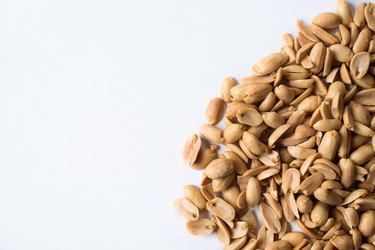
While many people hope to lose a few pounds, you might be struggling to gain weight. Whether you're a weight trainer aiming to build muscle or an underweight person trying to get to a healthier weight, a good place to start is knowing how many calories you need to eat to gain a pound of body weight.
Tip
To gain a pound, you have to eat 3,500 calories more than you burn.
Video of the Day
Put simply, to gain one pound, you will need to eat 3,500 calories more than the calories you burn, or use up. Eating an extra 3,500 calories per week — or 500 more calories each day — should lead to a one-pound weight gain per week. To gain weight in a safe and healthy way, focus on increasing your calorie intake slowly by consuming foods that are high in nutrients — vitamins, minerals and calories — as opposed to eating highly processed foods.
Video of the Day
Calculate the Calories You Burn
Before you begin upping your calorie intake, it's useful to know how many calories you expend daily. Begin by calculating your basal metabolic rate (BMR), says the Orange Regional Medical Center. Your BMR is the amount of calories your body burns just by carrying out its basic functions, such as breathing, circulating blood and repairing cells, according to the Mayo Clinic. The heavier you are, the higher your BMR, as it takes more energy to keep a larger body running.
How active you are during your waking hours determines how many calories you burn throughout the day in addition to your BMR. Your BMR plus the calories you burn through exercise and movement is the total number of calories you burn daily. Take note that these calculators are approximations. The amount of calories you burn at rest and during activity is dependent on your gender, body composition and metabolic rate.
Calculate the Calories You Eat
Next, calculate how many calories you eat. You can calculate how many calories you are consuming with a calorie tracker. To gain weight, this number should be more than the calories you burn daily. The National Institute of Diabetes and Digestive and Kidney Diseases has simplified these calculations with an all-in-one tool called the Body Weight Planner. Use this calculator to set a time goal for your weight gain as well as a suggested daily calorie intake.
While eating an extra 500 calories a day may help you gain a pound in a week, your calorie needs will increase a bit as you gain weight. Once your body is larger, you may need to eat slightly more to continue gaining weight.
Read more: How to Gain Weight Around the Rib Cage
Eat Calorie-Dense Foods
If counting calories isn't your thing, instead of setting a calorie goal for gaining a pound, you can simply focus on eating calorie-dense healthy foods. While soda, chips and other highly processed foods are calorie dense and can give you extra calories to gain a pound, they don't offer much in terms of nutrition.
Even when you're trying to gain weight, eat foods that offer other benefits, such as vitamins and minerals, to promote healthy weight gain. The same healthy foods recommended to someone trying to lose weight — fruits, vegetables, healthy proteins, fats and dairy — will help you gain. Just eat them in larger quantities.
Read more: Can Gaining Muscle Make You Gain Weight?
To put on pounds, concentrate on adding the higher-calorie options from these nutrient-rich food groups. For fruit, try bananas, pineapples, mangoes and dried fruits such as raisins and dates. Peas, potatoes, corn and winter squash all make healthy higher-calorie vegetable choices.
High-calorie options from the grain group include dense whole-grain breads and bagels, granola, raisin bran and quinoa. Salmon, tuna packed in oil, beans, hummus, tofu, soy nuts, cheese, whole milk and full-fat yogurt add both calories and protein.
Calorie boosters are foods that can help add extra calories to what you're already eating without adding bulk, which may be beneficial if you fill up fast or have a small appetite. High-calorie boosters include oils, salad dressings, nuts, seeds, nut butters, dried milk powder, half and half, cheese, eggs, wheat germ and avocados.
- Mayo Clinic: "Can I Boost My Metabolism to Lose Weight?"
- Orange Regional Medical Center: "Basal Metabolic Rate Calculator"
- Academy of Nutrition and Dietetics: "Healthy Weight Gain"
- Calorie Control Council: "Get Moving Calculator"
- NIDDK: "Body Weight Planner"
- Mayo Clinic: "Counting Calories: Get Back to Weight-Loss Basics"